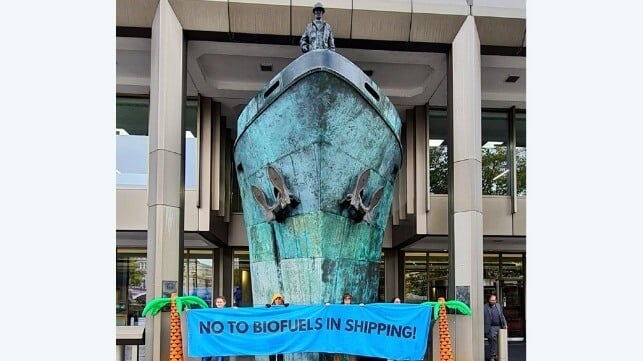Environmental Protestors Return to IMO to Campaign Against Biofuels

Timed to the start of the working group session of MEPC (Marine Environment Protection Committee) protestors have returned to the front of the IMO’s London headquarters, this time to demand an end to biofuels. The effort launched as the discussions continue about refining the framework for net-zero and just days after the IMO member states adjourned the discussion for the adoption for one year.
The working group is meeting behind closed doors to tackle some of the elements of the framework and fuels will be high on their agenda. Groups named Biofuelwatch, Forest Watch Indonesia, and Global Forest Coalition teamed up demanding that biofuels be excluded from the Net-Zero Framework.
The groups are calling attention to deforestation which they say biofuel is contributing to and accelerating in parts of the world. They assert that the land use change for crops such as palm oil and soy, to support biofuels wipe out claims of climate benefits. They also point to the growing issues of agricultural displacement and food insecurity demanding that the IMO exclude biofuels from the green alternatives in the Net-Zero Framework.
“Biofuels are not a sustainable solution under any circumstances,” said Jana Uemura, Climate Campaigner at the Global Forest Coalition. “If the IMO creates new demand for biofuels, it will unleash more emissions, more inequality, and more land grabbing.”
The groups point to data released earlier this year by the NGO T&E that said international shipping could become the fourth largest biofuel consumer, driving more demand for biofuels coming from food and feed crops. T&E estimated that biofuels could make up more than a third (36 percent) of the global fuel mix by 2030 with the share increased to 59 percent by 2035 and 76 percent by 2040. It would be mostly derived from soy and palm oil.
“We urge all IMO member governments to take a strong, united stance against the inclusion of biofuels in the Net-Zero Framework” said Pax Butchart, Biofuel Campaigner at Biofuelwatch. “The science is clear: crop-based and waste-derived biofuels cannot deliver real emissions reductions.”
The groups fear because it is a lower cost alternative, used cooking oil biofuel will attract strong demand far beyond its capacity. They note that the supply is highly constrained and largely already used in the transport sector. The global waste oil supply currently used for biofuel production, they assert, could only meet about five percent of shipping’s energy demand. With the limited supply, they fear the next alternative will be indirect land use change biofuels, contributing to crop displacement and food insecurity.

that matters most
Get the latest maritime news delivered to your inbox daily.
The groups highlight that major national and industry frameworks, including the EU’s Maritime and Aviation policies, the UK SAF Mandate, and the International Civil Aviation Authority’s CORSIA scheme, already exclude or cap high-ILUC biofuels, or include ILUC emissions in the life cycle accounting.
The groups are urging the working group to factor these issues into the discussions this week and move to exclude biofuels from the future alternative fuel options.
